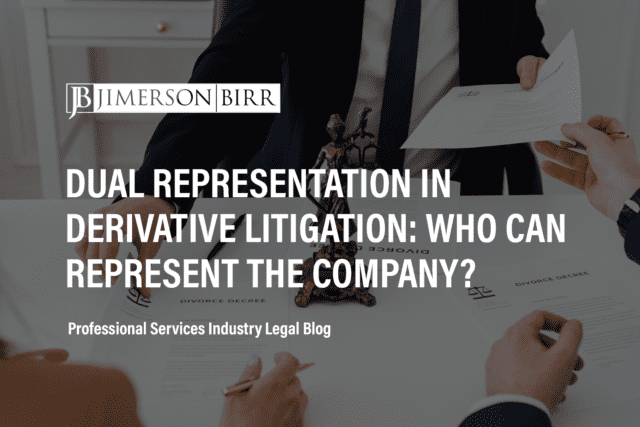What are shareholder derivative lawsuits?
A shareholder derivative lawsuit is a legal action brought by a shareholder on behalf of a corporation against a third party, such as an officer or director of the corporation, for wrongdoing or breach of fiduciary duty. The shareholder acts as a corporation representative and seeks to enforce the corporation’s rights against the third party. These lawsuits often hold corporate officers and directors accountable for their actions and ensure that the corporation’s interests are protected.
The shareholder bringing the lawsuit must demonstrate that the corporation’s management has refused action against the third party or that such an effort would be futile or ineffective. The shareholder must also show that they have standing to bring the lawsuit, which usually requires them to have owned shares in the corporation at the time of the alleged wrongdoing.
Need help with a matter related to shareholder derivative lawsuits? Schedule your consultation today with a top shareholder disputes and derivative litigation attorney.
In Florida, which laws and regulations apply to shareholder derivative lawsuits?
In Florida, shareholder derivative lawsuits fall under the Florida Business Corporation Act (FBCA), which sets forth the procedures for bringing such a lawsuit. Some relevant provisions include:
- Stat. § 607.0741 outlines the requirements the shareholder must meet before being eligible to bring a derivative lawsuit.
- Stat. § 607.0742 states that a shareholder may bring a derivative action on behalf of the corporation if they have made a demand on the corporation’s board of directors to take action and the board has failed to act within a reasonable time or if the shareholder can show that such a demand would be futile.
- Stat. § 607.0744 outlines how a corporation may get a shareholder’s derivative lawsuit dismissed. Also, it sets forth the requirements for pleading and proving the elements of a shareholder derivative lawsuit.
- Stat. § 607.0746 discusses the payment of proceeds and expenses stemming from the derivative suit.
Additionally, the Florida Rules of Civil Procedure govern the procedural aspects of bringing a shareholder derivative lawsuit in court, including filing the complaint, service of process, and discovery.
What are common issues in shareholder derivative lawsuits?
Some specific examples of issues that may give rise to a shareholder derivative lawsuit include:
- Mismanagement: Shareholders may allege that the corporation’s officers or directors failed to manage the company properly, harming the corporation and its shareholders.
- Fraud or Misrepresentation: Shareholders may allege that the corporation or its officers or directors engaged in fraudulent or deceptive practices, such as misrepresenting financial statements or withholding material information from shareholders.
- Self-Dealing: Shareholders may allege that the corporation’s officers or directors used corporate resources for personal gain or entered into transactions that benefit themselves at the corporation’s expense.
- Breach of Fiduciary Duty: Shareholders may allege that the corporation’s officers or directors breached their fiduciary duty to the corporation and its shareholders by engaging in actions that were not in the corporation’s best interests.
- Corporate Waste: Shareholders may allege that the corporation wasted corporate assets or engaged in actions that were not in the corporation’s best interests.
- Insider Trading: Shareholders may allege that the corporation’s officers or directors engaged in insider trading by using confidential information to buy or sell stock in the corporation.
When a set of facts is appropriate to cause shareholder derivative lawsuits, there are many paths a claimant may take. We are value-based attorneys at Jimerson Birr, which means we look at each action with our clients from the point of view of costs and benefits while reducing liability. Then, based on our client’s objectives, we chart a path forward to seek appropriate remedies.
To determine whether your unique situation may necessitate litigation, please contact our office to set up your initial consultation.
What evidence does a plaintiff generally need to file a shareholder derivative lawsuit, and what are common legal defenses to those claims?
To successfully file a shareholder derivative lawsuit, the plaintiff generally needs to provide evidence that:
- Standing: This typically means they must have been a corporate shareholder at the time of the alleged wrongdoing.
- Corporate inaction: The plaintiff must demonstrate that they made a demand on the corporation’s board of directors to take action, and the board failed to do so within a reasonable time or that such a demand would be futile.
- The alleged wrongdoing caused harm to the corporation: The plaintiff must demonstrate that the alleged misconduct caused harm to the corporation, such as financial losses, reputational harm, or other damages.
- The plaintiff is acting in the best interests of the corporation and its shareholders: The plaintiff must show that they are acting in good faith and the best interests of the corporation and its shareholders.
Common legal defenses to shareholder derivative claims include:
- Lack of Standing: The defendant may argue that the plaintiff does not have standing to bring the lawsuit because they did not own shares in the corporation at the time of the alleged wrongdoing.
- Failure to Make a Demand: The defendant may argue that the plaintiff failed to make a proper demand on the corporation’s board of directors to take action before bringing the lawsuit.
- Business Judgment Rule: The defendant may argue that the alleged actions were taken in good faith and in the corporation’s best interests and that the business judgment rule protects the actions from liability.
- Statute of Limitations: The defendant may argue that the lawsuit was not filed within the applicable statute of limitations period.
- Lack of Causation: The defendant may argue that the alleged wrongdoing did not actually cause harm to the corporation.
To see what actions or defenses may be available for your unique situation, please contact our office to set up your initial consultation.
Frequently Asked Questions
- What is the purpose of a shareholder derivative lawsuit?
The purpose of a shareholder derivative lawsuit is to hold corporate officers and directors accountable for their actions and ensure that the corporation’s interests are protected. If successful, any damages or other remedies awarded due to the lawsuit would be paid to the corporation rather than the individual shareholder.
- How does a shareholder bring a derivative lawsuit?
To bring a shareholder derivative lawsuit, the shareholder must demand the corporation’s board of directors to take action, and the board has failed to act within a reasonable time, or the shareholder can show that such a demand would be futile. The shareholder must also demonstrate that they have standing to bring the lawsuit, which usually requires them to have owned shares in the corporation at the time of the alleged wrongdoing.
- What kind of damages can a shareholder recover in a derivative lawsuit?
Any damages or other remedies awarded due to the lawsuit would be paid to the corporation rather than the individual shareholder. The damages may include recovering losses caused by the wrongdoing, punitive damages, and attorneys’ fees.
Have more questions about a shareholder derivative lawsuit-related situation?
Crucially, this overview of shareholder derivative lawsuits does not begin to cover all the laws implicated by this issue or the factors that may compel the application of such laws. Every case is unique, and the laws can produce different outcomes depending on the individual circumstances.
Jimerson Birr attorneys guide our clients to help make informed decisions while ensuring their rights are respected and protected. Our lawyers are highly trained and experienced in the nuances of the law, so they can accurately interpret statutes and case law and holistically prepare individuals or companies for their legal endeavors. Through this intense personal investment and advocacy, our lawyers will help resolve the issue’s complicated legal problems efficiently and effectively.
Having a Jimerson Birr attorney on your side means securing a team of seasoned, multi-dimensional, cross-functional legal professionals. Whether it is a transaction, an operational issue, a regulatory challenge, or a contested legal predicament that may require court intervention, we remain a tireless advocate every step of the way. Being a value-added law firm means putting the client at the forefront of everything we do. We use our experience to help our clients navigate even the most complex problems and come out the other side triumphant.
If you want to understand your case, the merits of your claim or defense, potential monetary awards, or the amount of exposure you face, you should speak with a qualified Jimerson Birr lawyer. Our experienced team of attorneys is here to help. Call Jimerson Birr at (904) 389-0050 or use the contact form to schedule a consultation.


We live by our 7 Superior Service Commitments
- Conferring Client-Defined Value
- Efficient and Cost-Effective
- Accessibility
- Delivering an Experience While Delivering Results
- Meaningful and Enduring Partnership
- Exceptional Communication Based Upon Listening
- Accountability to Goals











